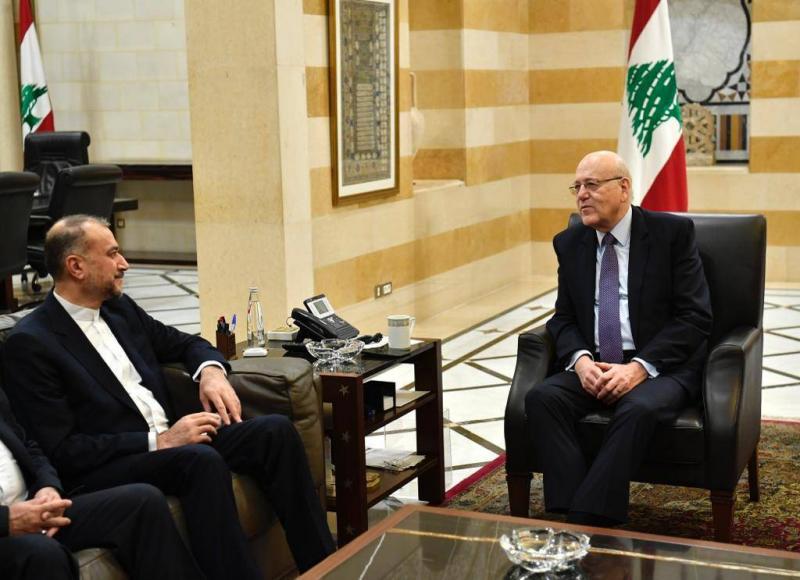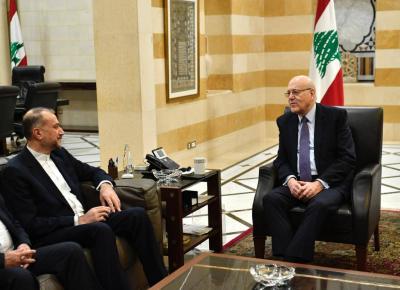Iranian Foreign Minister Hossein Amir Abdollahian stated today, Saturday, that "developments in Gaza are moving towards a political solution, while Israeli Prime Minister Benjamin Netanyahu still sees the solution in war." The Iranian minister, according to a statement from the Iranian foreign ministry following his meeting with caretaker Prime Minister Najib Mikati, emphasized that "everyone must try to find a political solution to end the Israeli attacks and war crimes against the Palestinians as soon as possible."
Abdollahian considered that his meeting with the Prime Minister "is a continuation of discussions with Lebanon and consultations with the officials of this country, which is one of Iran's important priorities." He affirmed "Iran's strong support for Lebanon's stability and security, noting that some have tried to create a rift between the government and the people of Lebanon and the resistance, but they have not succeeded."
He thanked Lebanon and the Prime Minister for their support of Palestine and its resistance, adding that "the Islamic Republic of Iran confirms its support for the resistance in Palestine, as it has previously done, but at the same time, it has attempted over the past four months to stop the Israeli attacks against Gaza and prevent the expansion of the war in the region." He continued: "The Palestinians are the true owners of Palestine and should be the ones to make decisions regarding Palestine and its future. We are aware that they have plans and political initiatives for the post-war phase. Developments in Gaza today are heading towards a political solution, but Netanyahu still sees the solution in war to save himself."
Abdollahian emphasized the necessity for everyone to attempt to find a political solution to end the Israeli attacks and war crimes against the Palestinians as soon as possible. The Iranian Foreign Minister met with the Lebanese caretaker Prime Minister Najib Mikati in Beirut this morning, where they discussed the latest developments in the Palestinian arena and the region.
For his part, Mikati described the situation in the region as "changing and complex," stressing the importance of the Gaza and Palestine issue and the need to continue efforts aimed at achieving an immediate ceasefire in Gaza. He added that "we look forward to peace and stability in the region, and efforts must be made to end the war on Gaza and remove the threat of expanding the war in the region."
Abdollahian's meetings in Beirut included Secretary-General of Hezbollah Sayyed Hassan Nasrallah, representatives of Palestinian factions, and Speaker of the Parliament Nabih Berri. After his meeting with Nasrallah, Abdollahian stressed that "in any political initiative, the role of the Palestinian people and consensus among Palestinian leaderships and groups should be the basic foundation."
Abdollahian discussed with a Palestinian delegation that included Secretary-General of the Islamic Jihad Movement Ziad Nakhala, Hamas leader Osama Hamdan, and Deputy Secretary-General of the Popular Front for the Liberation of Palestine Jamil Mzahr, the latest political and field developments in Palestine and the war in Gaza, according to a statement from the Iranian foreign ministry. He asserted that "the Palestinian nation and Palestinian factions alone have the exclusive right to determine their destiny," while other regional and international players should refrain from imposing their plans.
Later, Abdollahian traveled to Ain al-Tina to meet with Speaker of the Parliament Nabih Berri, where they reviewed "the developments in Lebanon and the region in light of Israel's continued aggression against Gaza and the Lebanese border villages in the south adjacent to the occupied Palestine." After the meeting, Abdollahian simply stated: "The meeting was good."
Subsequently, Abdollahian headed to the foreign ministry, where he met with the Lebanese caretaker Foreign Minister Abdallah Bouhabib. In a joint press conference with his Lebanese counterpart, the Iranian Foreign Minister stated, "The countries of Iran and Lebanon did not seek to expand combat actions in the region after four months of the Islamic Resistance Movement's (Hamas) attack on Israel, which led to a series of escalations across the Middle East." He added, "Iran and Lebanon affirm that war is not the solution, and we have never sought to expand it."
For his part, Bouhabib said: "I was honored today to receive the Iranian Foreign Minister Dr. Hossein Amir Abdollahian, as part of his commitment to regular consultations with us on regional affairs and international developments, and regarding the relations between the two countries." He continued: "I briefed him on the Lebanese perspective for finding a sustainable solution that restores calm and stability to the south, through a comprehensive framework that ensures the full implementation of Security Council Resolution 1701, halting Israeli violations, and ensuring Israel's withdrawal from all Lebanese territories it still occupies, including the Shebaa Farms. This is accompanied by strengthening the number and capabilities of the Lebanese armed forces to enable them to perform their responsibilities, according to Resolution 1701. Lebanon does not want war nor seeks it. We want stability and calm, and to restore rights to their rightful owners. There was a convergence in views regarding the risks posed by the continued war on Gaza and the ongoing crimes against the Palestinians, which undermine chances for a just and comprehensive peace in the region. We also emphasized the necessity for the international community to bear its responsibilities in deterring Israel and stopping the war and delivering humanitarian aid." Bouhabib added: "Additionally, we discussed several issues where I heard from the minister about Iran's commitment to Lebanon's stability."




